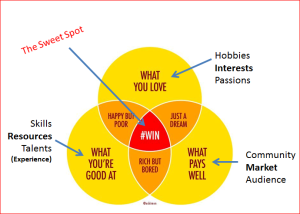How do you take your hobby and turn it into a business?

We have small cake business here in Lahore. I started this with my partner* last year in September. That business is a classic case-study on how to start a business based on the hobby of cooking.
Looking closer, I have found that the following 3 factors are the primary lessons from this. I hope they help you in starting your own hobby-based business:
1. Understand the Basics
See the following diagram (go ahead, click it to enlarge it)

We need to be in the center. That’s the sweet spot.
Your resources and talents, your passion and love will not bring in the money. Repeat after me: the fact that you enjoy something doesn’t mean you’ll be able to sell it.
For most of us, we can see the hobby, the passion. We can see how we can make it, ship it to the customer.
But we do not learn selling.
We do not see if there is a market for it. If there is no market, there’ll be no cookie. So simple right? But so many people invest in an office before they invest in some basic market research. Don’t make that mistake.
Be aware of all three circles, you’ll do fine. God willing. To see if people will buy, we need to test our hobby. So that’s what we’re gonna do….
2. See if Your Hobby has a Market
A “Market” has a lot of definitions. I define it simple as “someone with a problem”. The problem – and its perceived severity – is what creates demand.
But how do you find out if there is a demand? No need to hire research agencies just yet. You yourself will do just fine.
From starting a milk distribution business (I surveyed a 100 households the good ol’ fashioned way) to writing an eBook (I ask anyone who joins the list and this is the number one question I got!), the simple act of asking is enough to get you started.
Go and ask people. It really is that simple. Here are a few pointers I learnt that may help you in doing this “market research”:
- Ask Potential Customers Only: We make the mistake of asking the wrong people. Ask people who you think may be potential clients, not your Aunt or your Mother (unless of course they are part of the market).
- Keep It Interesting: We think “research” to be a boring subject. It is boring if you’re doing it just for the sake of research.You ought to be concerned with the results. Just keep the questions you ask directly related to your ultimate result: will people buy your product? That will keep it interesting.
- Sell as Research: In many cases, the best way to do market research is to actually start selling! Just go out there and try to sell your product and/or service. You will get some serious, well qualified, useful feedback. This usually applies to most services (like offering web design or copywriting services etc) but you can also read up on Minimum Viable Product creation to get the ball rolling quickly.
For example:
My hobby was/is web design. So I just went into offices, confidently asking to meet the owner and then make my sales pitch.
I got better at it as time went by. I learned the market by trying to sell. I adjusted and moved on, making more money and serving better clients! “Trying to sell” is a great way to do market research.
3. See If You Really Like Doing This
All hobbies, interests or passions are not created equal. Our primary purpose is to make a profit from something we enjoy doing! Ask yourself these questions:
- Can you Give Time? You pursue your hobby in your free time. But do you see yourself pursuing your hobby at least 2 or 3 hours every day, five days a week?
- Do You Want to Manage as well as Create? Would you still like your hobby if other administrative tasks were associated with it? For example, baking cakes and dealing with clients are two different things that you may have to do all by yourself!
- Are You IN It? A good test I have seen is: can you discuss the ins and outs of your hobby, instead of just “doing it”? I love to play football but hardly follow it on television, for example. That may or may not be a problem for your hobby business down the road.
Many people think that important-sounding reasons like ‘cash flow’ or ‘down economy’ cause businesses to close. Many a times, business close because owners lost interest.
So see if you can manage to work on this hobby for the long-term. Think in terms of years instead of months.
—
We have seen how a hobby becomes a business when your interests overlap with people willing to pay you to solve their problem.
We have seen that you can easily do market research and for many businesses, this anecdotal, fun research is more than good enough to get you started.
And we have seen that you need to test your hobby: is it really something you can do long term.
Hope these three aspects get you thinking in the right direction for your hobby business. Let me know in the comments section if this helps you and/or if you have any suggestions or questions.



